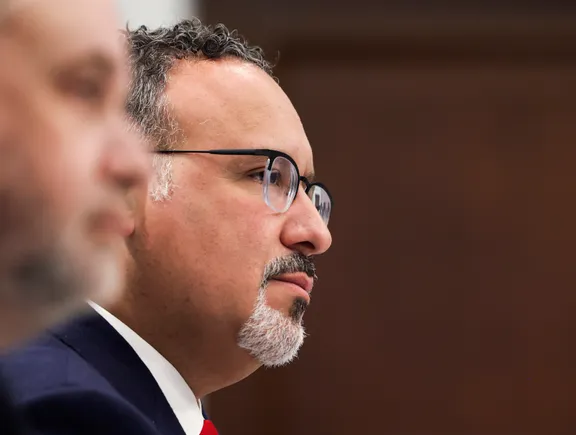Matthew Kuchem is associate director of the Campus Free Expression Project at the Bipartisan Policy Center. Previously, he was a political science professor at Bethel University, in Minnesota, and served on the faculties of Indiana University Bloomington and DePauw University, in Indiana.
The past seven months have set the credibility of higher education on fire.
The botched response by America’s most prestigious universities to the Oct. 7 terror attack on Israel has damaged the public’s trust in all higher education. The troubles that continue to plague high-profile institutions like Columbia University in the wake of the latest Israel-Hamas war are just the most visible currents of a deeper crisis of confidence.
According to a December survey by U.S. News & World Report and The Harris Poll, 58% of Americans believe that “university leaders are failing students today.” A 2023 Gallup poll shows that only 36% have high confidence in higher ed.
America’s colleges and universities have been the envy of the world. But at home, Americans are increasingly doubting the perceived value of college.
In his research for his book, “The Price You Pay for College,” personal finance expert Ron Lieber has found that students and their parents expect three things from college: education, kinship and a credential. But institutional politicization and self-censorship and censoriousness by students and faculty are eroding civil discourse and free speech norms, undermining the quality of education and camaraderie.

Matthew Kuchem
Permission granted by Matthew Kuchem
Navigating out of this storm requires a major course change — not empty bromides or better communications tactics. To chart a path forward, presidents and their leadership teams will have to implement real free expression reforms on their campuses.
Free expression missteps can have disastrous consequences for institutions.
Witness the exodus of donors from Harvard University for its free speech hypocrisy or the enrollment drop-off at the University of Missouri in 2016 in the wake of campus protests.
Mizzou’s unrest made national news when professor Melissa Click attempted to forcibly remove a student journalist covering the protest. The university fired the professor, and the campus police urged people to report “hurtful” speech so the university could punish those students.
Missouri learned some important lessons and overhauled its free expression policies. In 2017, it adopted a robust free expression statement and implemented new policies that protect the right of peaceful protest. It remains to be seen whether Harvard pursues needed reforms.
Beyond avoiding self-inflicted crises, universities will have to shore up their return on investment. The competition among institutions will become increasingly Darwinian as higher education faces a looming demographic cliff. Markets may determine the value of credentials, but colleges control what sort of education and community they offer students.
Savvy presidents should leverage free expression as a market differentiator. But this will require more than just adopting a statement or penning an essay. Prospective students and their parents expect achievements, not talking points.
What can colleges do to earn back credibility and demonstrate their value?
First, presidents should consistently implement clear free expression policies that promote open yet respectful debate.
Does your campus limit debate to a free speech zone? Do posters, pamphlets and student newspaper articles require administrative approval? Are students or faculty reprimanded for expressing unpopular views? Do some controversial expressions enjoy greater protection than others?
If most answers are yes, then no one will believe presidential platitudes about free expression. Hypocrisy is like a cheap suit — it may look good from a distance but doesn’t hold up to closer inspection.
Institutions must shore up protections for free expression while confronting its counterfeits. The harassment and assault of students at Columbia and other institutions is not free speech but illegal speech, in violation of both the law and institutional policy. A climate of threats and intimidation stifles the civil exchange of views and destroys the education and kinship value of college.
Second, presidents should take concrete steps to enhance viewpoint diversity. Only about 1 in 9 professors are conservative. And conservative students are about twice as likely as liberal students to be afraid of expressing their political views, according to a 2023 survey from the Constructive Dialogue Institute and More in Common. Former Harvard President Derek Bok has argued that rebuilding trust will require senior leaders to get serious about ideological diversity on their campuses.
Don’t think ideologically diverse candidates are available for hire? Invite faculty from other institutions to campus for a lecture or debate hosted by the department chair and the president.
Beyond hiring a more ideologically diverse faculty and staff, presidents should promote and fund programs, courses, events, debates and clubs that feature unorthodox and underrepresented viewpoints.
All these should be fully woven into the daily life of the university. One-off events are like a guest appearance in a serial — occasional and not enough to change the show’s direction.
Universities should normalize and showcase free expression and healthy discourse across differences. Presidents should lead by example by frequently taking the stage to moderate civil conversations with an ideologically diverse array of guest speakers.
The university should offer diverse programming, which requires more than offering token events that highlight a conservative issue. While ideological balancing is important, the ultimate goal is to show that the university is engaging in deep conversations across divides while remaining above the political fray.
The faculty should have a reputation for being great educators — not advocates. Professors should be known for obfuscating their own views, skillfully managing debates on hot topics, and offering courses that examine a wide range of perspectives.
Evidence of such efforts should be highly visible. It should regularly appear on the college website, its campus poster boards, its alumni magazine and its admissions materials. Prospective students and their parents should hear about these efforts in their conversations with admissions counselors, current students and recent alumni. Thin evidence suggests a thin commitment.
Some colleges and universities are excelling at these tasks, but many others aren’t even receiving a passing grade. This moment represents both a challenge and an opportunity for college presidents to embrace real reform and prove the enduring value of a college education. The future of higher ed depends on it.
#Colleges #free #expression #reform #damage #control










